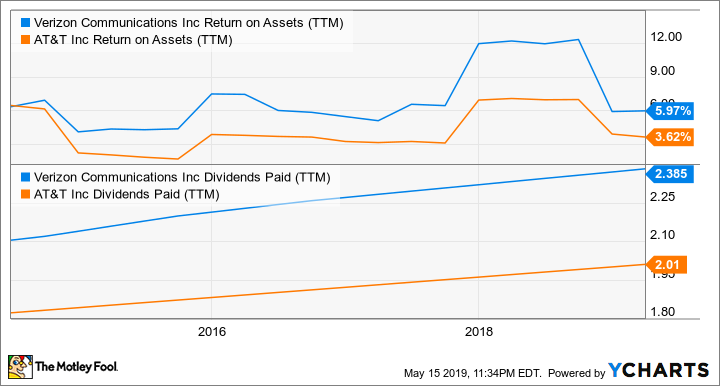Better Buy: Verizon vs. AT&T
One could argue that Verizon (NYSE: VZ) and AT&T (NYSE: T) are a duopoly sitting atop the U.S. telecommunications industry. The companies have the two largest wireless customers bases in the U.S., as well as the biggest wireless networks in the industry. Smaller competitors like Sprint and T-Mobile have very little chance of competing with such a large advantage.
Where Verizon and AT&T diverge is their strategies for future growth. Verizon is doubling down on its core business, while AT&T thinks adding bundled services like cable TV and streaming solutions will add value. That difference is key to how to look at these companies differently.

Image source: Getty Images.
The baseline looks similar
First, let's look at the market cap and operating metrics of Verizon and AT&T. You can see that they are similar in size and generate comparable net income, but AT&T has a revenue advantage after buying DIRECTV and Time Warner.
VZ Revenue (TTM) data by YCharts.
As a result of those deals, AT&T has more debt than Verizon ($175.5 billion to $113.7 billion). But if the acquisitions are the right strategic move, they could pay off in the long term.
Where these telecommunications giants diverge
Where operations start looking a little different is when you look at the efficiency of Verizon's and AT&T's use of capital. They're in a highly capital-intensive business, so generating even a slightly better return on assets than competitors is a big deal. You can see that Verizon has performed significantly better from a return on assets perspective, and that's led to a faster-growing dividend.
VZ Return on Assets (TTM) data by YCharts.
Verizon has just a little more appeal to consumers or a little more pricing power, leading to better margins. And long-term it may be set up better for success.
Seeing the telecommunications world differently
I haven't even mentioned the 5G network investments both Verizon and AT&T are making today. If recent trends continue, 5G should be another differentiator over smaller competition, allowing them to maintain high margins. So there's not a huge difference between the two in 5G strategy, although there may be a difference in priorities.
Where differences emerge is the investment in adjacent businesses. AT&T bought DIRECTV and Time Warner in order to get into the content distribution business. DIRECTV is a service it can bundle with wireless and owning Time Warner will ensure that it has content to deliver to customers.
Verizon has tried buying tech assets like Yahoo and AOL to dive deeper into technology, a move that has not played well after a massive writedown. But Verizon hasn't done as much bundling except in locations where it offers fiber-optic service.
From a strategic perspective, I think Verizon is better off because it's focusing primarily on its core business. AT&T is adding content, which sounds smart, but people are un-bundling from cable packages and watching less live TV. That could ultimately diminish the value of DiIRECTV and Time Warner, which are way behind companies like Disney and Netflix in moving to a world of streaming.
The better buy today
There are a lot of similarities between Verizon and AT&T, from their size to market cap. What I think makes Verizon the better buy today is the fact that it's not distracted by content creation and distribution in the way AT&T is. When push comes to shove, does a 5G network get resources, or does the next Game of Thrones pilot take precedence? AT&T may have a hard decision to make, but Verizon doesn't.
The one weakness for Verizon is its 4.2% dividend yield compared to 6.3% for AT&T. But in the long term, I think Verizon can make up for the difference with dividend growth, something AT&T might struggle to provide given the investment needed to stay on top of both the telecommunications and content creation businesses.
More From The Motley Fool
Travis Hoium has no position in any of the stocks mentioned. The Motley Fool owns shares of and recommends NFLX and DIS. The Motley Fool recommends TMUS and Verizon Communications. The Motley Fool has a disclosure policy.


